Disclosure: My dog blog is supported by dog parents just like you. I only recommend products that I would use on my dogs. All opinions expressed here are my own. I sometimes earn a small affiliate commission, at no extra cost to you, when you click through the affiliate link and purchase something. You can read more about my affiliate policy here.

Independence Day fireworks season is here! And there is nothing that says patriotism more than beautiful colors lighting up the sky. However, those beautiful colors come with really loud noises, and for some dogs those noises are frightening. Fireworks anxiety in dogs can be avoided or at least reduced with a little preparation.
Many years ago, we ran a family fireworks stand. At closing, we found a little chihuahua hiding, terrified under our camper. I tried for weeks to find his parents, without any luck. So, my two small children and I gave him a forever home. My kids wanted to name him Firecracker; however, my daughter could not say her “r’s”.
Therefore, the three “r’s” in Firecracker gave her fits, so the little chihuahua became Boomer. He was definitely a victim of fireworks anxiety in dogs. Our first year with Boomer, I knew exactly how he ended up lost in the first place.
Likewise, 23 years later, I have Edward, my Morkie, who is terrified of loud noises. He certainly suffers from fireworks anxiety in dogs. In addition, during this time every year I have to work extra hard to keep him calm.
What Fireworks Anxiety in Dogs Looks Like
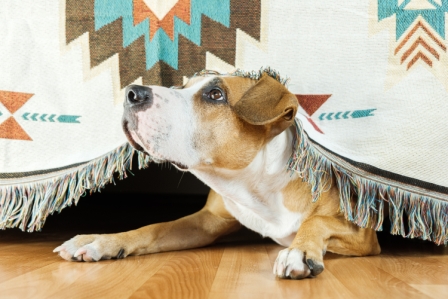
Thunder, fireworks, and loud vehicles are probably the most common noise phobia triggers for dogs. Whichever noise phobia, the experience is distressing for dogs and dog parents.
Dogs with a fear of fireworks will create their own coping strategies when the noise starts. In addition, the following strategies will help you recognize that your dog might be suffering from fireworks anxiety:
- attempts to escape the home
- seeking out dark den-like spaces to hide in, such as under the bed
- crawling behind a bathroom sink or toilet
- pacing back and forth
- not focusing on parents who are attempting to calm them
- excessive panting
- pupil dilation
- sweating paws
- faster heartbeat
- loss of appetite
- whimpering
- trembling
- inability to settle down
- signs of hypersalivation
- ears back
- tail tucked
- attention seeking
- urinating or defecating in the house
- clinging to parent for comfort
Furthermore, dogs with noise phobia can be destructive by chewing, digging, scratching and tearing up objects at home.
“Some dogs become restless and move around anxiously with no apparent purpose, while others become immobile, shutting down and unable to move.”
Kristen Collins, Vice President of the ASPCA Behavior Rehabilitation Center; Associate Certified Applied Animal Behaviorist
Veterinarians and shelters find themselves extra busy every year, July 3rd through 6th. Furthermore, veterinarians say that July 3rd they see numerous clients seeking calming drugs for their dogs.
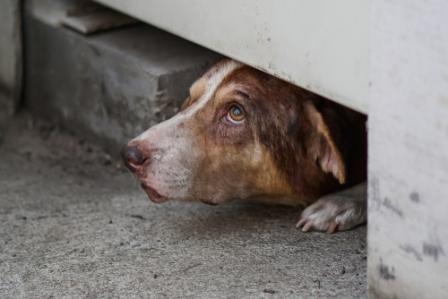
On the other hand, shelters have an influx of lost dogs on July 4th through 6th. There are more well, fed, groomed and trained dogs lost on July 4th than any other day.
Animal control officials across the nation report a 30-60% increase between July 4th and 6th, according to PetAmberAlert. In addition, PetAmberAlert is a lost pet finder that uses phone and fax broadcasts to help lost pets.
5 Tips to Help Your Dog at Home During Fireworks
- Exercise your dog… Take a long walk with your dog before the evening to drain some energy. Furthermore, exercise leads to higher levels of serotonin in the brain. Therefore anxiety decreases helping to cope with stress.
- Keep your dog inside during fireworks… When the noise starts your dog might run, so make sure the windows and doors are secure. Also, fences and tethers may not be as secure as inside the house.
- Provide a safe place for your dog to escape to… This is essential in the absence of human companionship. This might be a closet, bathroom, even a bathtub, or a basement. In addition, the best places usually don’t have windows and are small, enclosed areas. However, there needs to be plenty of artificial light to mask the flashes of fireworks. If an adult can’t stay at home and your dog is comfortable with it, consider a crate. Also, consider covering the crate with a blanket.
- Spend time with your dog in the provided safe place… This is essential if you are staying at home with your dog. Likewise, if your dog comes seeking comfort, give it to him or her. Your comforting arm and presence can help your dog to cope as long as you remain calm.
- Try using sensory enrichment to calm your dog… Sensory enrichment would include tactile therapy, scent therapy, and sound therapy combined with desensitization. Tactile Therapy: Canine wraps and weighted vests provide gentle, constant pressure to help reduce stress. Scent Therapy: A variety of all-natural mists on the market can help dogs relax and cope. Sound therapy: Playing music for your dog can help with fireworks anxiety. Sound therapy combined with desensitization: Canine Noise Phobia Series is an innovative desensitization training tool designed to reduce and prevent noise phobias and anxiety in dogs.
4 Tips for Keeping Your Dog Safe
Whether staying home or going with you, you need to prepare your dog for safety during fireworks. Here are some tips to help:
- Keep your dog on a leash… So, if your dog doesn’t stay home, then keep him or her with you and on a leash. This goes for even if your dog has never shown signs of fireworks anxiety. This is because there could always be a “first”.
- Make sure your dog’s ID collar and/or tag is up to date… Your dog’s name, your name and a phone number should be clearly visible on a collar and/or a tag. In addition, your dog needs to be wearing the ID collar and/or tag.
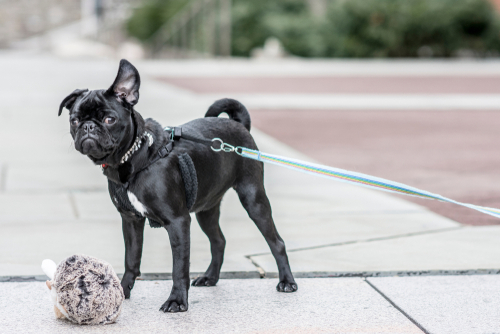
- Your dog’s collar and harness needs to fit… A dog can easily slip out of a collar or harness if it is not correctly adjusted. Furthermore, you should be able to slip two fingers snugly between the collar and the neck. A loose collar or harness will slip right off if your dog twists and pulls against a leash.
- Microchip your dog… This is by far the best chance that your dog is returned to you if found. In addition, it is the best proof you have that your dog belongs to you. Shelters and vets examining a lost or unclaimed dog will find the chip and then find you. Therefore, be sure to keep your contact information up to date.
In Conclusion
I always wondered who Boomer’s first parents were. He wasn’t wearing a collar with tags, nor was he microchipped. In addition, this was before Facebook and the many lost and found pet groups on Facebook.
In addition to the tips above, be sure to seek advice from your veterinarian on alleviating your dog’s anxiety. Have a safe and fun 4th of July with your family, including the 4-legged kids.
Do you have any additional tips for helping keep dogs calm and safe on this noisy holiday? We would love to hear about them in the comments below.
The following posts on our site might be of interest to you:
If you like what you’ve read, you can use one of the following images and pin to Pinterest.
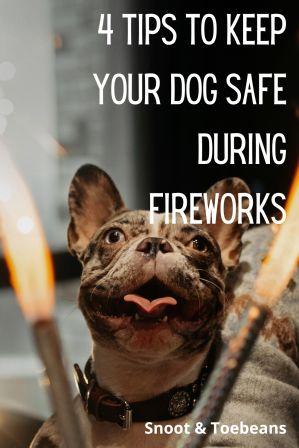
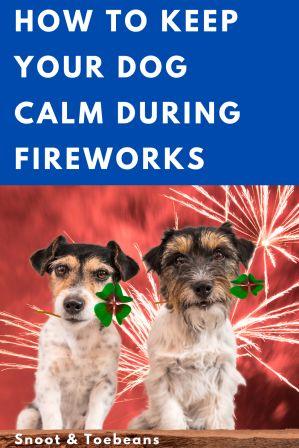
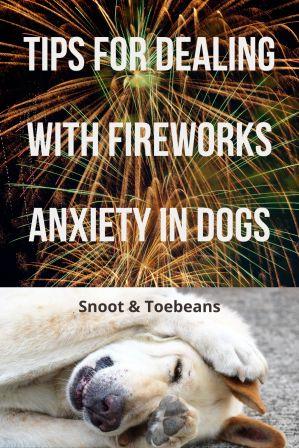
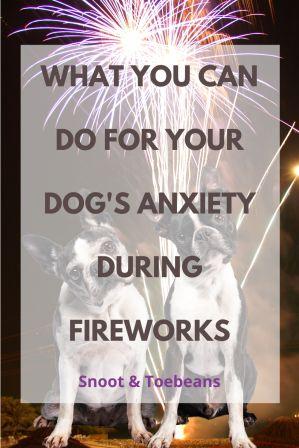

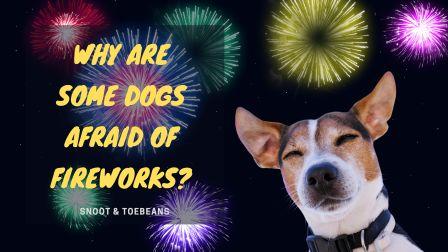

Oh, my! This is so sad! In my neighborhood many pups run away during these dates and storm season. A couple of days before Ind Day, I was at my mom’s, and someone was popping fireworks, and her German Shepherd started acting crazy hitting the door. Once my mom took him into the garage, and turn the lights off, he was fine. He also gets like that when a storm approaches.
Yes, Nidia, it is super sad how many dogs go missing during the fireworks and storms season. I’m glad your mom has found a solution that works for her German Shepherd. Dogs can hear way better than us, so it is super intensified for them with loud noises. Most of the time, highly sound sensitive dogs will know long before us when a storm is coming. I hope your mom’s dog stays safe the rest of the storm season and until everyone finally finishes popping the fireworks they bought. Tell her dog I said hi!